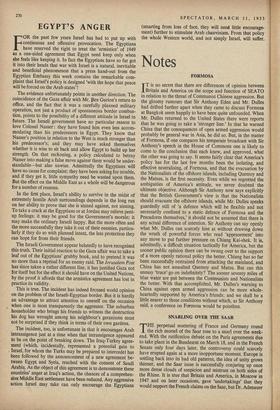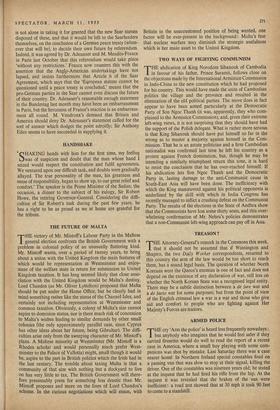SNARLING OVER THE SAAR T HE perpetual muttering of France and
Germany round the rich morsel of the Saar rose to a snarl over the week- end. With the ratification debate on the Paris agreements due to take place in the Bundesrat on March 18, and in the French Senate only four days later, the controversy could scarcely have erupted again at a more inopportune moment. Europe is settling back into its bad old patterns, the idea of unity grows thinner, and the Saar issue is successfully conjuring up once more dense clouds of suspicion and mistrust on both sides of the Rhine. It is true that Britain and America, in Moscow in 1947 and on later occasions, gave 'undertakings' that they would support the French claims on the Saar, but Dr. Adenauer is not alone in taking it for granted that the new Saar statute disposed of these, and that it would be left to the Saarlanders themselves, on the conclusion of a German peace treaty (when- ever that will be), to decide their own future by referendum. Indeed, it was agreed by Dr. Adenauer and M. Mendes-France in Paris last October that this referendum would take place 'without any restrictions.' France now counters this with the assertion that the Anglo-American undertakings have not lapsed, and insists furthermore that Article 6 of the Saar Agreement, which says that the 'European statute cannot be questioned until a peace treaty is concluded,' means that the pro-German parties in the Saar cannot even discuss the future of their country. Dr. Adenauer's reasonable enough statement in the Bundestag last month may have been an embarrassment in Paris, but the fierceness of France's reaction is an embarrass- ment all round. M. Vendroux's demand that Britain and America should deny Dr. Adenauer's statement called for the sort of answer which dodges the point adroitly; Sir Anthony Eden seems to have succeeded in supplying it.











































 Previous page
Previous page